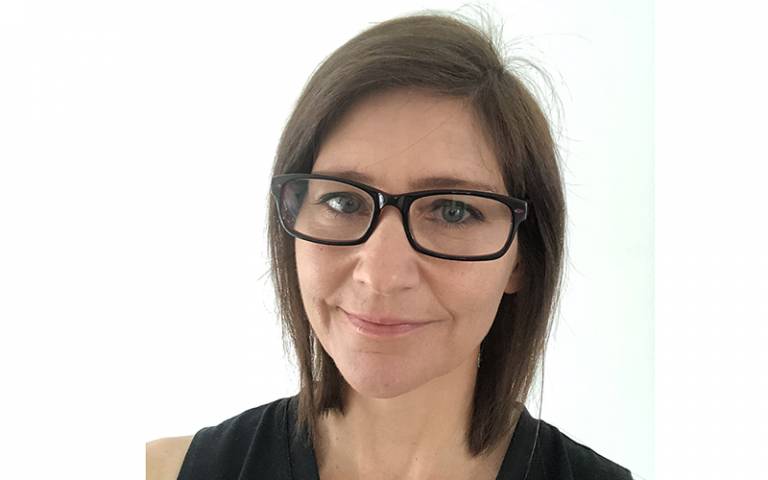On the occasion of her Inaugural Lecture on 7 December, we spoke to Jacqui van der Spuy, Professor of Molecular and Cellular Biology at our institute.

Tell us a bit about your work
My research is focused on the molecular neurobiology of inherited retinal dystrophies and neurodegenerative diseases, and the translation of fundamental molecular and biochemical insights of disease-causing mechanisms to therapeutic interventions. With a particular focus on Leber’s congenital amaurosis type 4 (LCA4), as well as other inherited retinal dystrophies, including non-syndromic and syndromic early onset inherited retinal diseases and juvenile macular dystrophies, my research moreover aims to combine advances in stem cell and gene editing technologies to develop new pre-clinical models of these human retinal dystrophies using three-dimensional retinal organoid and retinal pigment epithelium models. These models in turn are a valuable tool in my research enabling the exploration of new therapeutic approaches, including pharmacological interventions, gene augmentation therapy, antisense oligonucleotide therapy and direct base and prime editing approaches.
Why is your research important?
The prevalence of inherited retinal degeneration is approximately 1 in 2000 individuals, affecting more than two million people worldwide. The quality of life is severely affected by the irreversible progression towards blindness which leads to reduced mobility and independence, thereby posing a major socioeconomic and psychological burden. In 2019, the total costs to primary and secondary healthcare, individual productivity and well-being was estimated at >£500 million in the UK. To date, the development of a cure or treatment to stop or slow the rate of disease progression is limited, and there is therefore a huge unmet need to both understand the mechanisms underlying inherited retinal dystrophies and to find an effective therapeutic intervention for these diseases. This is even more so true for the group of very rare inherited retinal diseases that my research group focuses on. I believe that the recent incredible advances in stem cell and gene editing technologies can play a significant step towards the development of treatments for these diseases, reducing the devastating impacts of incurable inherited blindness.
What inspires you in your work?
I am inspired by the incredible work of Jennifer Doudna, who in 2020 received the Nobel Prize in Chemistry together with Emmanuelle Charpentier for their pioneering work on CRISPR gene editing. Closer to home, I am privileged to have benefitted from the support and mentorship of Professor Mike Cheetham, who first encouraged me to apply for and was sponsored by the Welcome Trust Travelling Fellowship in his laboratory at the Institute of Ophthalmology. It has been amazing to see the journey and emergence of a true giant in the field and his leadership and guidance have been a constant inspiration. Finally, the pace of revolutionary technological breakthroughs on an almost exponential scale and impacting major advances in the biological and biomedical sciences is exciting and exhilarating. I feel inspired, privileged and challenged daily to be working in science at such an exciting time.
What has been your most memorable career moment so far?
Interestingly, my most memorable career moment to date is not related to my research. I was honoured to participate in a UCL Graduation Ceremony at the ExCel Centre in March 2022 for the Faculties of Brain Sciences, Life Sciences, Medical Sciences and Population Health Sciences, one of the first ‘in-person’ ceremonies following the start of the COVID-19 pandemic. I delivered the platform party presentation as the Dean’s representative for the Faculty of Brain Sciences and conferred the postgraduate awards for students from the respective parts of the Faculty. It was such a joy to celebrate the achievements of these young scientists at the beginning of their own journey of scientific discovery and reminded me both of my own motivation and wider reasons for embarking on a scientific career. It also afforded me the opportunity to have a lovely conversation with Professor Geraint Rees, Vice Provost (Research, Innovation and Global Engagement), whom I would otherwise not have the opportunity to cross paths with.
What do you like to do outside work?
I love spending time with my family and a good walk in the beautiful countryside with our miniature longhaired dachshund. I also enjoy road cycling, although I am a fair-weather cyclist who uses the opportunity to keep in touch with friends more than to keep fit.
What book is currently on your bedside table?
I have just finished reading The Stray Cats of Homs by Eva Nour, a profoundly moving book based on true events in the besieged city of Homs. A difficult but highly recommended read. I have just started reading Hilary Mantel’s, Wolf Hall. I was intrigued by a pre-recorded interview with Hilary following her death on 22 September 2022 discussing her take as a historical fiction writer on the rise of Thomas Cromwell. I hope it will be good.
Professor Jacqui van der Spuy delivered her Inaugural Lecture on 7 December.
Watch Professor van der Spuy's Inaugural lecture
Links
- Professor Jacqui van der Spuy's profile
- Professor Jacqui van der Spuy's van der Spuy lab page
- UCL IoO Inaugural Lectures
 Close
Close

